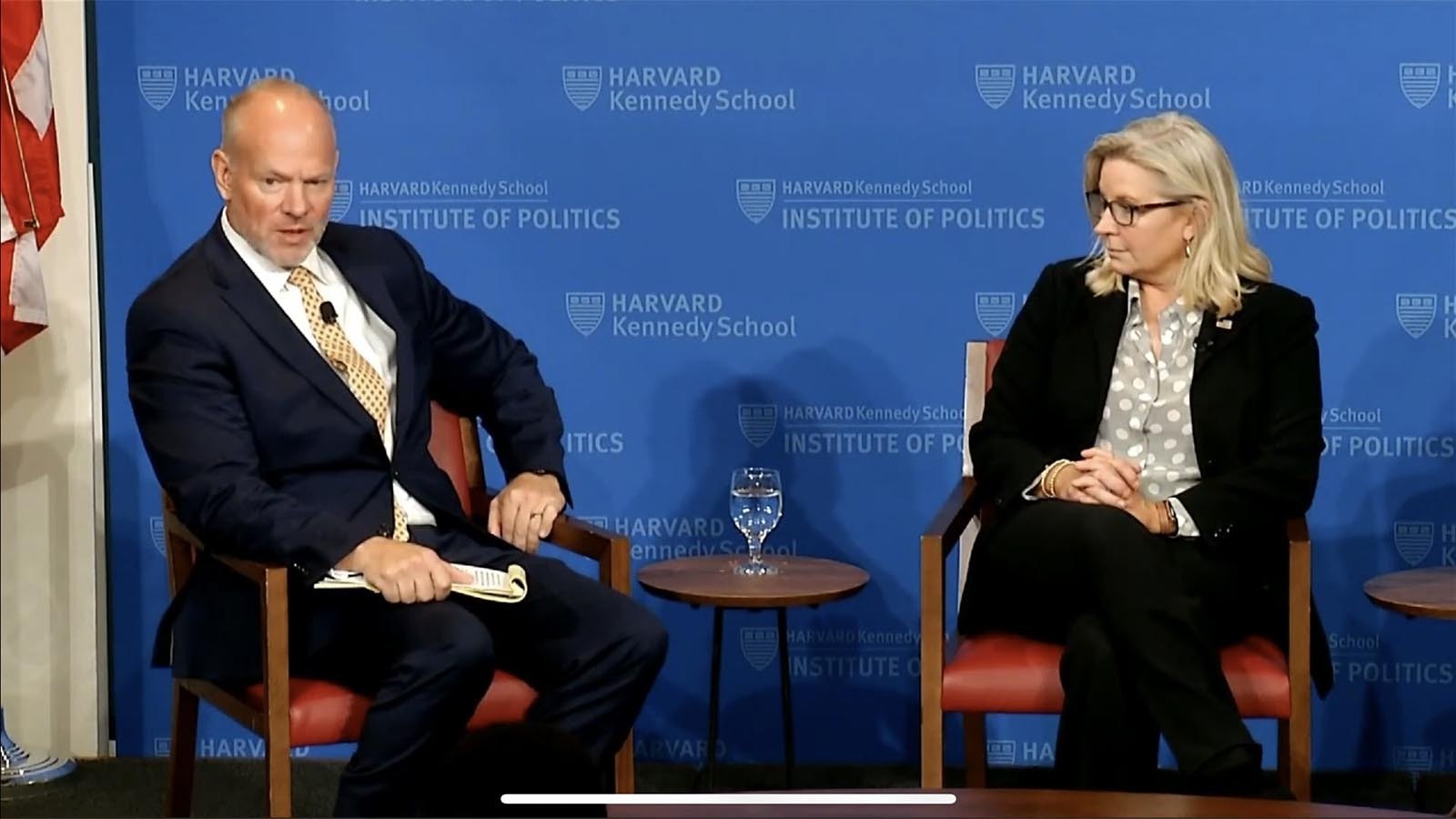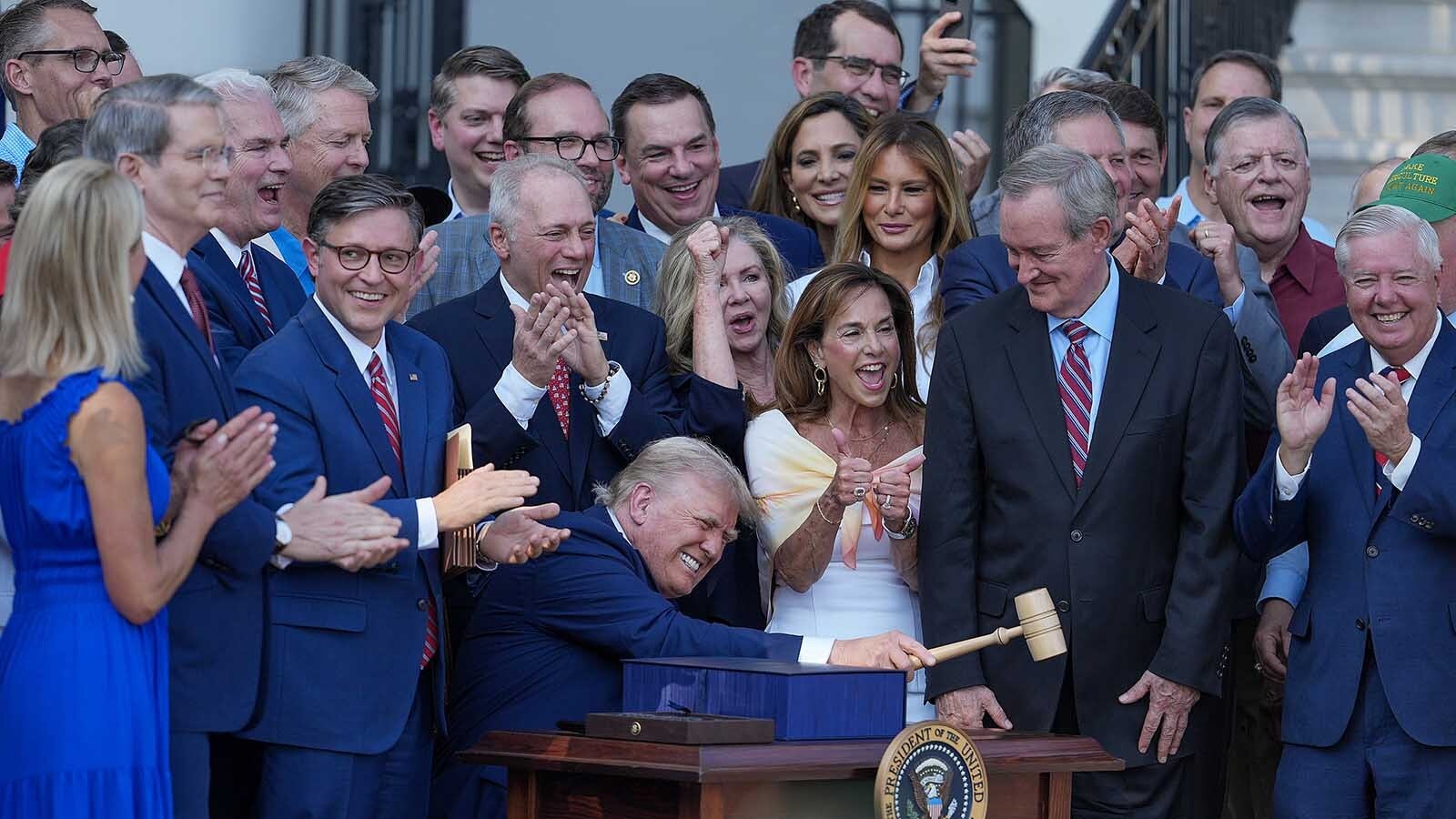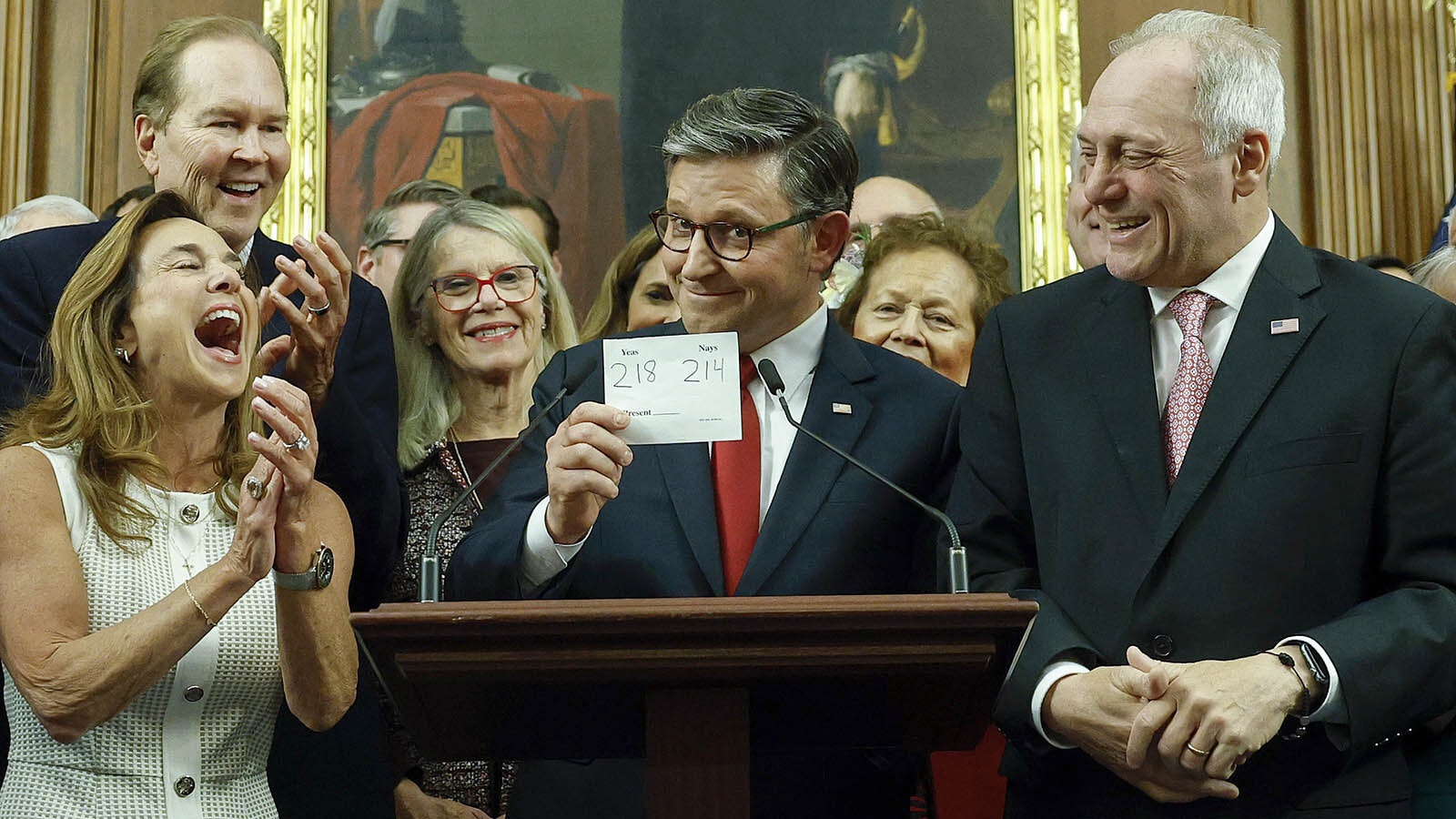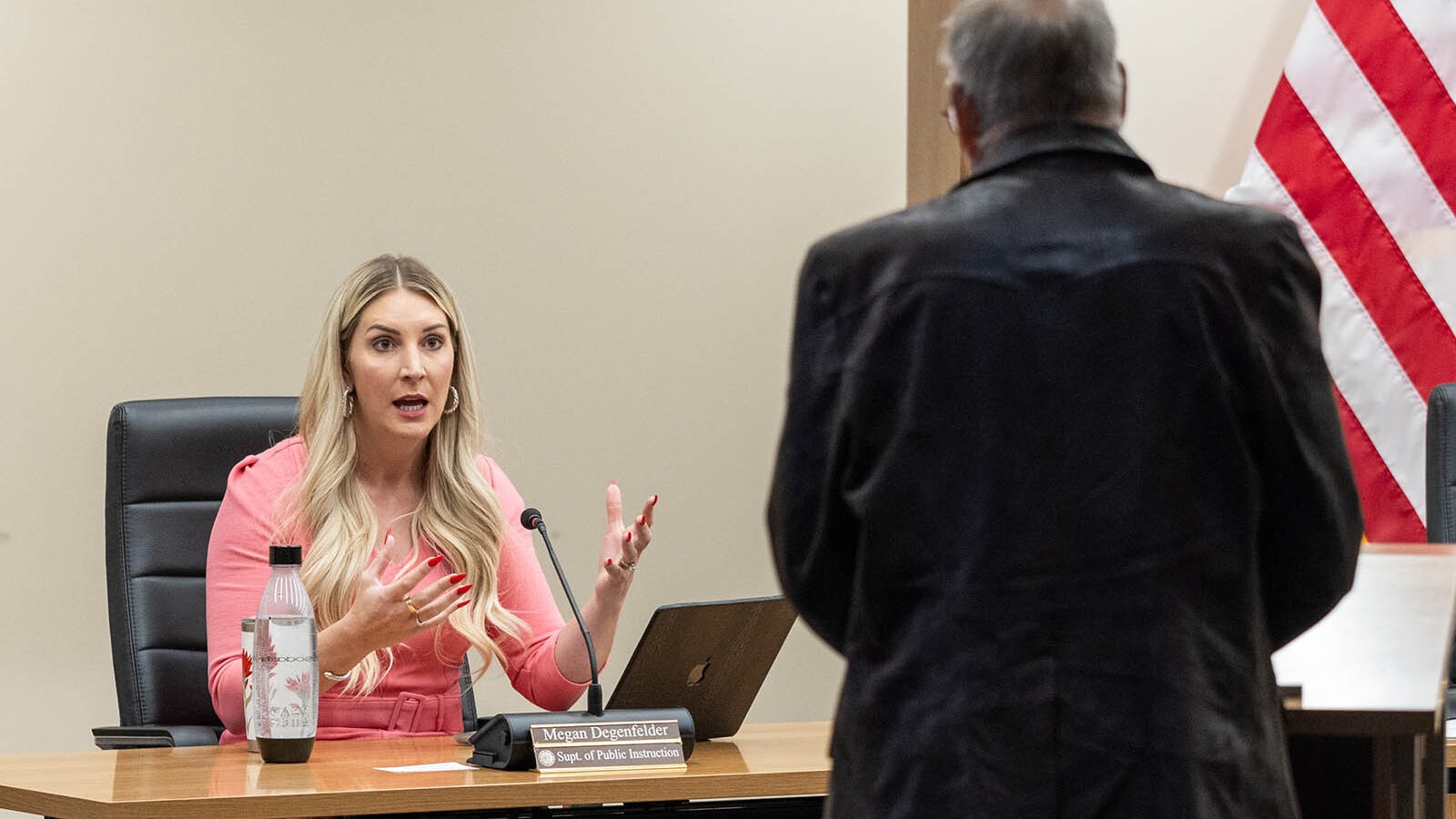By Leo Wolfson, State Political Reporter
Leo@Cowboystatedaily.com
Former Wyoming Gov. Matt Mead and U.S. Rep. Liz Cheney took the stage together Tuesday night at a Harvard University forum in Boston.
Mead was complimentary toward the outgoing congresswoman in the one-hour long forum stating that he believed she has inspired people all over the country.
“Maybe one of the most important things in my mind a politician could do is to provide hope and examples of leadership,” Mead told Cheney.
Mead was a moderator for the John F. Kennedy Junior Forum, hosted by the Harvard Kennedy School Institute of Politics. He was Wyoming’s governor from 2011-19 and U.S. attorney for Wyoming from 2001-07.
‘The Most Important Thing I’ve Ever Done’
Cheney described her recent role on The United States House Select Committee to Investigate the Jan. 6 Attack on the United States Capitol as “the most important thing I’ve ever done professionally.”
Various polls have shown that Cheney’s role on the committee cost her votes in the August primary election and made her a divisive figure among Wyoming Republicans. After winning her previous three elections by a landslide, she lost to challenger Harriet Hageman by 38% of the vote in August.
Hageman, who’s been endorsed by former President Donald Trump, has said the 2020 election was “rigged” and a “travesty.”
“You shouldn’t vote for people who tell you that they will ignore the rulings of the courts, and they will ignore the facts, and they’ll ignore the law,” Cheney said. “And they’ll ignore the results of elections unless they agree with them.”
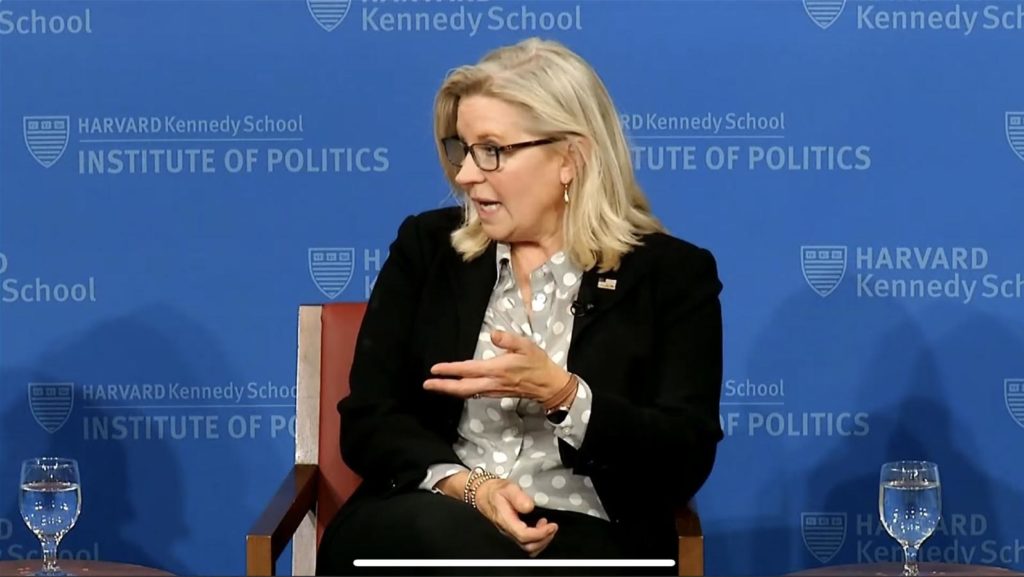
‘Determined,’ Not Defeated
Mead said Cheney’s concession speech did not appear to be the picture of defeat, but rather a commitment to determination.
“Determined to make sure that the rule of law was followed, determined to make sure that we’re doing the right things in this country to protect our democracy,” he said.
Last week, Cheney finished what will likely be the committee’s last public hearing by delivering a motion to subpoena Trump to testify for the committee.
“We’ll be issuing the subpoena shortly, both for his testimony under oath as well as for documents,” she said. “We’ll take whatever next steps we have to take, you know, assuming that he will fulfill his legal obligation and honor the subpoena.”
Trump is not expected to honor the subpoena and testify before the Committee.
Historical Impact
Cheney said the Jan. 6 Committee will be viewed in history for the information it has provided and legislative changes she believes it will inspire. She mentioned the bravery she and others learned about, performed by those who tried to prevent the attack.
Cheney said earlier this fall that if Trump is the Republican nominee for president in 2024, she would no longer consider herself a Republican. On Tuesday, Cheney said she doesn’t know if Trump will get the nomination.
Cheney said although she still considers herself a conservative and much more aligned with the Republican Party rather than the Democrats, she said the U.S. Constitution must be held above all else.
“We have to get back to recognizing we all have an obligation to defend the foundations – the Republic,” she said. “That’s what provides the basis for the disagreements about policy.”
Similar Beliefs
Mead’s warm relationship with Cheney did not begin Tuesday. They both come from Wyoming political families and Mead gave $500 to Cheney’s primary campaign.
He is a resident fellow at the Harvard Institute for Politics. Former U.S. Senator Al Simpson served for two years as director of the Institute of Politics at the Kennedy School.
Mead said the Institute has had many conversations about the state of democracy in America and the Republican Party.
“It’s interesting that this time in my life, we’re saying, ‘Well, how’s our democracy doing? But it starts with a number of things,” Mead said.
Mead mentioned the Jan. 6 Capitol attack and how U.S. Sen. Mitch McConnell said the event was performed on Trump’s behalf. He also referenced former President Barack Obama, who blamed Trump for inciting the event.
A number of Republicans who originally spoke out against Jan. 6 walked back their statements or went quiet on the topic.
“Elected officials have a responsibility to make sure that their constituents have the truth, they have a responsibility to help to guide the direction of events and not just sit and watch,” she said.
Many members of the Republican Party take an opposite view, saying a legislator should be a direct lever, operating at the desire of the people they are representing.
Lack Of Republicans
One of the largest criticisms levied against the Jan. 6 Committee was its makeup. Only two Republicans sit on the nine-member panel.
The committee had originally been envisioned as a bicameral commission, set up much like the 9/11 Commission, to study the actions and decisions made that led to the Sept. 11, 2001, terrorism attacks. Republicans filibustered this effort in the U.S. Senate.
“I think they thought, if we don’t have a bipartisan commission, we won’t have an investigation and that will be better politically for Republicans,” Cheney said.
I think it was a sense of putting politics first and thinking this is not going to be politically a good thing for to be focused on.”
U.S. Rep. Kevin McCarthy, Republican leader of the House, nominated five Republicans for the committee, of which U.S. Nancy Pelosi, Democratic leader of the House, rejected two because of their votes to overturn the Electoral College results in Arizona and Pennsylvania during the 2020 presidential election.
“I agreed with her decision,” Cheney said.
McCarthy pulled the other three nominees at that point, scrapping any hope the Committee would be bipartisan.
“Because the minority leader, the Republican leader of the House, decides that he doesn’t want investigation of this attack, that can grind everything to a halt?” Cheney questioned. “I certainly am of the view that can’t be the case.”
Cheney mentioned how some Democratic members of the Jan. 6 Committee now are her greatest allies. She joked about how Rep. Jamie Raskin, D-Maryland, wrote a book alleging that her father, former Vice President Dick Cheney, and former President George W. Bush stole the 2000 election.
The Future Of Democracy
Cheney encouraged the mostly student audience to become engaged in politics by running for office. A late 2021 Harvard poll showed that more than half of young Americans believe democracy is under threat in the United States and more than a third said they may see a second civil war during their lifetimes.
“None of us can be a bystander,” she said. “We live in a country where you get to decide who your elected officials are. You get to decide, we all get to decide what laws we live under. And it’s an unbelievable blessing.”
Cheney’s Electoral Reform Act still has not been discussed in the U.S. Senate, while a more moderate bill sponsored by Republican U.S. Sen. Susan Collins of Maine has been making progress through that body. On Tuesday, Cheney said she believes in limits when it comes to the federalization of elections, mentioning her opposition to the 2021 John Lewis Voting Rights Act.
“People of goodwill have different views about the extent to which that particular piece of legislation would have given too much power and authority to the federal government,” she said.
Cheney said she considered running for U.S. Senate in 2020 but now is glad she didn’t make that decision. She complimented the beauty of Wyoming and spoke positively about her experience representing the state, but said she is disturbed by its politics.
“The chairman of the Republican state party in Wyoming is a member of the OathKeepers,” she said. “You have happening in our state what we see happening in a number of places around the country, which (is) that people have gone in and have been elected to offices to, you know, precinct level offices and others, and have taken over party structures in a way that does present, I think, a real threat to democracy.”

